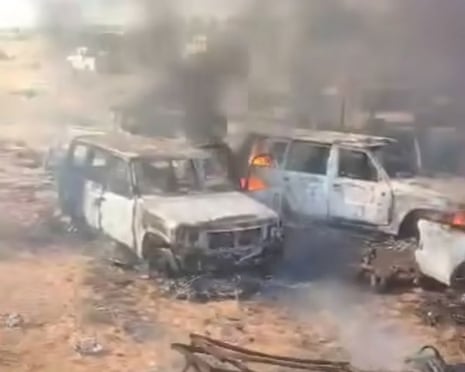
Reports of ethnically motivated mass killings and other atrocities are emerging from El Fasher after the paramilitary Rapid Support Forces took control of the city in Sudan’s western Darfur region over the weekend.
Video released by local activists showed a fighter known for executing civilians in RSF-controlled areas shooting a group of unarmed civilians sitting on the ground at point-blank range.
Different footage shared by pro-democracy activists purportedly showed dozens of people lying dead on the ground alongside burnt-out vehicles. The footage has not been verified.
In a statement on Tuesday, the Joint Forces – who are allied with Sudan’s army – accused the RSF of having executed more than 2,000 unarmed civilians in recent days.
The claim could not be verified but Yale University’s Humanitarian Research Lab, which has been monitoring the war in Sudan using open-source intelligence and satellite imagery, said on Monday it had found evidence consistent with alleged mass killings by the RSF.
On Tuesday, the Yale lab said the city “appears to be in a systematic and intentional process of ethnic cleansing of Fur, Zaghawa, and Berti Indigenous non-Arab communities through forced displacement and summary execution”. This included what appeared to be “door-to-door clearance operations” in the city, it said.
The RSF said on Sunday it had seized control of the army’s main base in the city and released a statement saying it had “extended control over the city of El Fasher from the grip of mercenaries and militias”.
The Sudanese army chief, Gen Abdel Fattah al-Burhan, said on Monday that his forces had withdrawn from El Fasher “to a safer location”, acknowledging the loss of the city.
The RSF has been engaged in a bloody civil war with the army since April 2023 after a power struggle between the two sides. More than 150,000 people have been killed and more than 14 million displaced due to the fighting.
Fears had been mounting in recent weeks for the safety of tens of thousands of civilians trapped in the city by an 18-month RSF siege.
The UN rights chief, Volker Türk, said on Monday there was a growing risk of “ethnically motivated violations and atrocities” in El Fasher. His office said it was “receiving multiple alarming reports that the Rapid Support Forces are carrying out atrocities, including summary executions”.
The UN Human Rights Office said there were reports of “summary execution of civilians trying to flee, with indications of ethnic motivations for killings”, as well as videos showing “dozens of unarmed men being shot or lying dead, surrounded by RSF fighters who accuse them of being [Sudanese army] fighters”.
News agencies have been unable to contact civilians in the city, where the Sudanese Journalists’ Syndicate says communications, including satellite networks, have been cut off by a media blackout.
Shayna Lewis, a Sudan specialist at Preventing and Ending Mass Atrocities, one of the groups closely in touch with Darfur civilian society, accused the RSF of massacring civilians. She said: “Residents of El Fasher who previously left the city are finding out about the death of their loved ones through footage of executions that are widely circulating on social media.”
There are grave fears of a repeat of the RSF massacres that took place in West Darfur’s capital, Geneina, after it captured the city in 2023, when up to 15,000 civilians – mostly from non-Arab groups – were killed.
According to the UN, more than 1 million people have fled El Fasher since the start of the war and about 260,000 civilians, half of them children, remain trapped without aid. Many have resorted to eating animal fodder.
The UN’s migration agency said more than 26,000 people had fled the fighting in El Fasher since Sunday, either seeking safety in the outskirts of the city or heading to Tawila, 45 miles to the west.
In Tawila, teams from Médecins Sans Frontières said they were facing a massive influx of wounded coming from El Fasher to the town’s hospital. Since Sunday evening, 130 had been hospitalised, including 15 in critical condition, MSF said.
Arjan Hehenkamp, Darfur crisis lead for the International Rescue Committee, said the town, which was already hosting a vast number of displaced people, was “at breaking point. Without a significant scale-up in humanitarian assistance, the suffering here will deepen further,” he said.
The RSF’s capture of El Fasher, the last remaining major city in Darfur controlled by the army, gives the paramilitary group control over all five state capitals in Darfur and marks a significant turning point in the war.
The army is now excluded from a third of Sudanese territory, a development that experts say raises the possibility the country could face partition.
Agence France-Presse contributed to this report